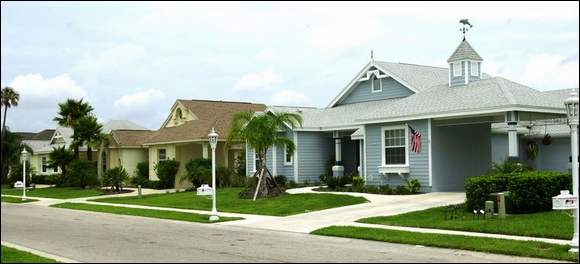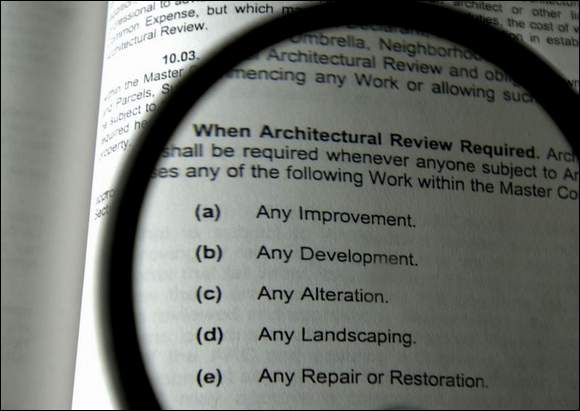| Published 7 - 5- 2003
BY LAUREN GLENN Article Courtesy of The Herald Tribune.com BRADENTON -- The only difference between the blue vinyl-sided house on Starboard Drive and the blue house on America's Cup Boulevard is that one has a Saturn in its driveway and the other has a white minivan. The houses have the same white trim, the same windows in the same places and the same mailboxes as everyone else in The Inlets, an upscale housing development off State Road 64.
The neighborhood's architectural review board makes sure it stays that way. Its members patrol to protect the community, not from lurking strangers or suspicious cars, but from the threats of unapproved paint colors and vegetation and of boats parked in driveways. There are at least 100 other possible violations listed in its inch-thick deed restrictions policy. Here, where the cost of a home starts around $400,000, privacy fences and motor homes are strictly forbidden. Any change made to the exterior of a resident's house is subject to the review board's scrutiny. The most modest violation can result in thousands of dollars in fines and even lawsuits.
Hundreds of communities in Manatee, Sarasota and Charlotte counties enforce such restrictions. Those communities vary from condominiums to massive, single-family-home subdivisions. George Merrick built one of the first deed-restricted communities in a Dade County housing development he named Coral Gables in 1921. His deed restrictions regulated everything from architectural style -- every home was Mediterranean revival style -- to paint color. By 1925, Coral Gables had evolved from the first deed-restricted community to a fully incorporated city, with 65 miles of roadway and more than 600 homes. The deed restrictions were used to set the city's zoning regulations.
Deed-restricted communities grew in popularity, and by the 1970s most counties contained one or more. Today, new developments where no restrictions are imposed are rapidly becoming the exception, rather than the rule. Larger master-planned communities such as Lakewood Ranch and Tara Preserve comprise several deed-restricted communities. Residents are drawn to them for the certainty that they will be well-maintained, but can become annoyed with the stringent uniformity that prevents them from displaying even American flags in their front yards. Keeping watch At The Inlets, an architectural review board guards against anything that could risk property values -- rogue Winnebagos, the wrong shade of paint, overgrown hedges and trash cans left too long at the curb. The eight members of the neighborhood board keep watch privately, with their names kept quiet to avoid angry neighbors who resent being told to cut their grass and paint their houses. "People don't know who's on the review board," said Marge Hadley, vice president of Camlin Home Corp., the company that builds houses at The Inlets. "It's kept under wraps because you don't want a neighbor getting mad at you." Amy Sande, a resident of Riverclub and an active member of the community's homeowners association, said she doesn't worry about angry neighbors when she cites a resident for a policy violation. "It's my job," she said. In Riverclub, Sande said, some of the most common citations are for dirty roofs and landscape violations. Some complaints, she said, are less pressing -- a towel lying in a neighbor's driveway for instance, or a cat kennel another neighbor dislikes. "We've told them we're not there to police or be a gestapo," Sande said. "The biggest complaints are people complaining about other people." At Lakewood Ranch, a sprawling master-planned community with its own shopping center and country club, employees ensure that homes comply with deed restrictions. But, said Steve Johanson, 47, chairman of the Gleneagle homeowners association, neighbors are encouraged to police themselves and report any violations they see. In Lakewood Ranch, different sections have different sets of restrictions, some determined by the developers and others by homeowners. In Gleneagle, an affluent gated community, the rules are stringent and any change made by a property owner, whether it's the addition of a birdbath or the removal of a tree, must first be approved by a committee. Some people like that, Johanson said, but others do not. "The big thing that bothers residents the most would be the ornamental restrictions," said Johanson, who moved here three years ago from West Virginia. He said he thinks most people buy homes there without closely examining the deed restrictions. Lakewood Ranch has perhaps some of the strictest sets of policies of the dozens of deed-restricted communities in the region. And neighbors like to make sure the regulations are enforced. Disputes between homeowners and their communities can result in hefty lawsuits, with scores of defendants. One case -- a dispute over a porch at Manatee County's Vizcaya Condominiums -- resulted in a lawsuit with 357 defendants. By suing the homeowners association, the plaintiff, Karl Zimm, sued the entire community. The case was dropped after Zimm died. In another case, the Manatee Oaks homeowners association sued residents Timothy and Glenna Bare for $15,000 when they left a storage shed in their yard during renovations they were making to their home. The case was dismissed when the Bares removed the storage shed. Keeping up appearances But some problems cannot be removed with the ease of a shed or a boat or a trailer. Some problems stick, and neighbors, like it or not, must learn to cope. Recently a Lakewood Ranch resident painted his home a pale shade of yellow -- different from the pale yellow on the approved list of colors -- after receiving permission from the homeowners association. Other residents were infuriated, said Kay Culliton, a Lakewood Ranch resident and a Realtor with Prudential Palm Realty. "It had been approved, and it wasn't a bright yellow," she said. "But the neighbors are up in arms." Those neighbors are likely to fume until the paint begins to peel, fade, or turn dingy. Then the owner will be required by deed to repaint the house. Realtors emphasize that the restrictions exist to keep property values high and prevent eyesores such as the accumulation of broken-down cars and trash. "People don't want to live across the street from that," said Kelly Rowland, a real estate agent with Coldwell Banker in Bradenton. But the county has ordinances that prohibit debris and unsightly conditions on any property, including trash, waste, and extensive property damage. Most deed-restriction policies, while addressing issues such as billboards, focus on maintaining neighborhood uniformity as much as tidiness. Tara Preserve, a deed-restricted community off State Road 70, has a half-inch-thick policy forbidding everything from satellite dishes and radio towers to livestock. The document also allows the Tara Master Association to make or correct any changes to property at the homeowner's expense and without the owner's consent. "The best way to look at deed restrictions is not what you can't do, but what your neighbor can't do to you," Rowland said. She said communities without deed restrictions often suffer problems such as overgrown grass and trash in front yards. "I'd never live in a non-deed-restricted home," Culliton said. "They're just not maintained." People like deed restrictions, she said, because they provide residents with the assurance that their property values will remain high. Part-time residents, especially, prefer deed-restricted communities, Culliton said, because they're comfortable knowing that their homes will be the same when they return to Florida as when they left. But, Culliton said, there are times when the restrictions are too stringent, resulting in a type of blandness that sometimes makes her feel alone. "You feel like there's nobody that lives there," said Culliton, who moved here a year ago, and lives alone in a house in gated community, where garage doors must be kept shut and it's suggested that cars not be left in the driveway. Some neighbors even complain if they see children playing in front yards, she said. "It feels very vanilla," she said. "It's very isolated when you don't feel any activity. I don't like that you have to keep your garage door closed." |


